Aggiungi una trama nella tua linguaThe protagonist finds out that Glumov's diary has been stolen. He immediately runs out of the theater and climbs along the building's facade up to the roof where he was picked by an airplane... Leggi tuttoThe protagonist finds out that Glumov's diary has been stolen. He immediately runs out of the theater and climbs along the building's facade up to the roof where he was picked by an airplane. After a short flight, he jumps out of the airplane to fall into a car, carrying on his s... Leggi tuttoThe protagonist finds out that Glumov's diary has been stolen. He immediately runs out of the theater and climbs along the building's facade up to the roof where he was picked by an airplane. After a short flight, he jumps out of the airplane to fall into a car, carrying on his search for the diary.
- Self (takes bow at end)
- (as Sergei M. Eisenstein)
- Fascist clown
- (as Ivan Pyryev)
Recensioni in evidenza
Since it is an Eisenstein piece, the general reaction is that it is a harbinger of future glory and should be loved for that. Looking at it on its own merits, however, one is struck by the oddity of the piece. The Academician editing is staccato and as annoying as the clowns, and the pacing of the cuts is monotonous and as boring.
Academician editing had quicker cuts than was standard for the era and, indeed, for anything short of MTV editing. However, the constant rate of cutting makes all the clips of equal impact and prevent any sort of emotional connection. This may have been Eisenstein's intention, but it is too great a demand on the viewer. Eisenstein would learn to do better, but his failures here make this of no more than historical importance.
While it is hard to judge anything that is only five minutes long, this is certainly an interesting little piece of film history. Somewhat odd with all the clowns, a bit surreal perhaps... and the juxtaposition of the playful actors with tanks symbolizing war and death... quite strange.
Of course, had the director gone on to only make newsreels, I never would have been exposed to it. But he was Sergei Eisenstein, one of the great silent directors and the master of Soviet cinema. Can we find hints at his genius in this brief sample? Perhaps, perhaps not.
It is supposed to be a film adapting bits of Alexander Ostrovsky's play "Enough stupidity in every wise man." This debut film of Eisenstein suggests a visual Paris in Russia at a time when his contemporary Grigory Kozintsev was also making ''The New Babylon" (1929) in Paris and formulating "the Manifesto of the Eccentric Theater (FEKS)' with Leonid Trauberg in their silent films "The adventures of Oktyabrina' (1924) with clowns, "Mishki versus Yudenich" (1925), "The Devil's Wheel" (1926) and "The Overcoat" (1926), based on Gogol's play.
"Glumov's Diary" might look like it is all about clowns and circus antics. Yet you have a cross-dressing couple who implies marriage of the same sex!
Then there are also tanks and machine guns that allow clowns to use them as props!
In a film where the master filmmaker himself appears in front of the camera, the tricks of vanishing humans replaced by an ass or an innocent child, anticipates the power of cinema decades before it became common tricks of surrealism. Eisenstein is doffing his cap to the Dadaists of Paris without offending the Leninist mindset at home.
Lo sapevi?
- QuizLong assumed to be lost, this film by Sergei Eisenstein (two years before Sciopero (1925)) was re-discovered decades later, contained in a short newsreel compiled in 1923 by Dziga Vertov.
I più visti
Dettagli
- Tempo di esecuzione5 minuti
- Colore
- Mix di suoni
- Proporzioni
- 1.33 : 1
Contribuisci a questa pagina

























